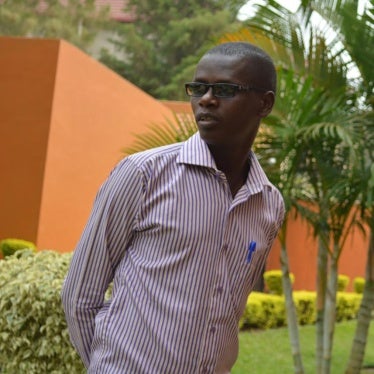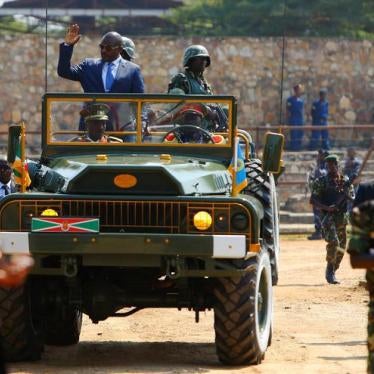Excellencies,
Ahead of the 39th session of the UN Human Rights Council (“HRC” or “the Council”), we, the undersigned national, regional and international civil society organisations, write to urge your delegation to support a resolution renewing the mandate of the UN Commission of Inquiry (CoI) on Burundi.[1] Such a resolution should also ensure continuity for the work of the CoI through continued adequate resourcing of its secretariat, including its crucial investigative and evidence-gathering work.
The renewal of the CoI’s mandate is critically important to improve the human rights situation in Burundi, and it offers the Council a number of practical and effective advantages. Among other things, it would allow the Council to:
- Avoid a monitoring gap, which is all the more important given the Burundian Government’s ongoing refusal to cooperate with the Office of the UN High Commissioner for Human Rights (OHCHR) and to sign a new Memorandum of Understanding regarding its presence in the country;[2]
- Ensure the continued documentation of human rights violations and abuses ahead of the upcoming elections of 2020, through testimonies of victims, witnesses, human rights defenders, and other actors operating in and outside of the country;
- Ensure ongoing public reporting and debates — while the African Union’s observers continue to monitor the human rights situation in Burundi despite a number of limitations imposed by the authorities, their findings are not publicly reported. Interactive dialogues at the Council provide the only regular space for public reporting and debates on human rights developments in the country; and
- Enable the CoI to continue to highlight under-addressed aspects of the crisis — for instance, the Commission has stressed the importance of dedicating more attention to violations of economic, social and cultural rights.
At the Council's 36th session (September 2017), the CoI informed the HRC that there were “reasonable grounds to believe that serious human rights violations and abuses have been committed in Burundi since 2015,” and that some of the violations may constitute “crimes against humanity.” At the 37th and 38th sessions of the Council (March and June-July 2018), the CoI described a political, security, economic, social and human rights situation that has not improved since September 2016. In March 2018, the Commission’s Chairperson, Mr. Doudou Diène, stressed that the situation in the country continued to deserve the Council’s “utmost attention.” In October 2017, the International Criminal Court (ICC) authorised an investigation into crimes committed in Burundi since April 2015. A preliminary examination of the situation had been opened in April 2016.
The constitutional referendum that was held on 17 May 2018 was marred with violence and repression, with arbitrary arrests, beatings and intimidation of citizens campaigning for a “no” vote.[3] The BBC and VOA, two of the country’s main international radio stations, have been suspended for 6 months at the start of the official campaign, illustrating the climate of fear in which journalists and medias were prevented from a proper coverage of the event.[4] In the Commission’s words, as of June 2018 “human rights violations, among which extrajudicial executions, enforced disappearances, acts of torture and other cruel, inhuman or degrading treatment […], facilitated by a continuing environment of threats and intimidation,” continue unabated. The CoI added: “The fact that several missing people have not been found and that unidentified bodies continue to be discovered in various parts of the country gives reason to fear the continuation of practices consisting of getting rid of the bodies of people arrested sometimes by individuals in police uniform or identified as agents of the National Intelligence Service (SNR) or the Imbonerakure.”[5]
Since it became a member of the Council, on 1st January 2016, Burundi has delivered multiple statements that have made clear its refusal to cooperate with human rights monitoring and investigation bodies and mechanisms. The Government has repeatedly launched attacks, which have sometimes descended to a personal level, against the High Commissioner, UN officials, and independent experts. With no basis or evidence, it has publicly questioned the independence, competence, professionalism, integrity and legitimacy of High Commissioner Zeid and his Office, and has threatened, stigmatised, and exercised reprisals against human rights defenders and civil society organisations.[6] Burundians who have sought protection outside of Burundi have been subjected to harassment and persecution, including by members of the National Intelligence Service (SNR) and Imbonerakure.
Members of the CoI continue to be denied access to Burundi. Furthermore, at the time of writing, the Burundian authorities have withdrawn visas from the team of experts mandated by HRC resolution 36/2, despite the fact that the latter was adopted at Burundi’s own initiative, with its support and the support of members of Burundi’s own regional group. Burundi’s action in this regard clearly violates its Council membership obligations.
Recalling the letter a group of civil society organisations wrote in September 2017,[7] we urge the Council, consistent with its mandate to address situations of violations of human rights, including gross and systematic violations, to pave the way for accountability by renewing the mandate of the CoI to enable it to continue monitoring human rights developments in the country, documenting violations and abuses, and publicly reporting on the situation.
We thank you for your attention to these pressing issues and stand ready to provide your delegation with further information as required.
Sincerely,
Action des Chrétiens pour l’Abolition de la Torture – Burundi (ACAT-Burundi)
African Centre for Justice and Peace Studies (ACJPS)
Amnesty International
Association Burundaise pour la Protection des Droits Humains et des Personnes Détenues (APRODH)
Association for Human Rights in Ethiopia (AHRE)
Centre for Civil and Political Rights (CCPR)
CIVICUS: World Alliance for Citizen Participation
Coalition Burundaise pour la Cour Pénale Internationale (CB-CPI)
Collectif des Avocats pour la Défense des Victimes de Crimes de Droit International Commis au Burundi (CAVIB)
Community Empowerment for Progress Organisation South Sudan (CEPO)
DefendDefenders (the East and Horn of Africa Human Rights Defenders Project)
East and Horn of Africa Human Rights Defenders Network (EHAHRD-N)
Eritrean Law Society (ELS)
Eritrean Movement for Democracy and Human Rights (EMDHR)
Forum pour la Conscience et le Développement (FOCODE)
Forum pour le Renforcement de la Société Civile au Burundi (FORSC)
Global Centre for the Responsibility to Protect (GCR2P)
Human Rights Concern – Eritrea
Human Rights Watch
International Federation for Human Rights (FIDH)
International Federation of Action by Christians for the Abolition of Torture (FIACAT)
International Movement Against All Forms of Discrimination and Racism (IMADR)
International Service for Human Rights (ISHR)
Ligue Iteka
Mouvement Citoyen pour l’Avenir du Burundi (MCA)
Mouvement des Femmes et des Filles pour la Paix et la Sécurité (MFFPS)
National Coalition of Human Rights Defenders – Burundi (CBDDH)
Observatoire de la Lutte contre la Corruption et les Malversations Économiques (OLUCOME)
Organisation pour la Transparence et la Gouvernance (OTRAG)
Pan-African Human Rights Defenders Network
Reporters Without Borders (RSF)
Réseau des Citoyens Probes (RCP)
SOS-Torture/Burundi
TRIAL International
Union Burundaise des Journalistes (UBJ)
World Organisation Against Torture (OMCT)
[1] See its webpage: www.ohchr.org/EN/HRBodies/HRC/CoIBurundi/Pages/CoIBurundi.aspx
[2] See the UN Deputy High Commissioner for Human Rights’ statement at the Council’s 37th session (OHCHR, “Introduction to country reports/briefings/updates of the Secretary-General and the High Commissioner under item 2,” 21-22 March 2018, www.ohchr.org/EN/NewsEvents/Pages/DisplayNews.aspx?NewsID=22875&LangID=E, accessed 20 July 2018).
[3] FIDH and Ligue Iteka, “A forced march to a Constitutional Referendum,” May 2018, www.fidh.org/IMG/pdf/report_burundi_may2018_referendum_on_constitution.pdf (accessed 27 July 2018).
[4] Reporters Without Borders, “Harassment of Burundi’s media intensifies for referendum,” 16 May 2018, www.rsf.org/en/news/harassment-burundis-media-intensifies-referendum# (accessed 7 August 2018).
[5] OHCHR, “Oral briefing by the members of the Commission of Inquiry on Burundi to the Human Rights Council,” 27 June 2018, www.ohchr.org/EN/NewsEvents/Pages/DisplayNews.aspx?NewsID=23274&LangID=E (accessed 20 July 2018).
[6] See DefendDefenders, “Headlong Rush: Burundi’s behaviour as a member of the UN Human Rights Council,” 25 July 2018, www.defenddefenders.org/publication/headlong-rush-burundis-behaviour-as-a-member-of-the-un-human-rights-council/ (accessed 25 July 2018).
[7] “Renewing the Mandate of the Commission of Inquiry on Burundi and Ensuring Accountability for Serious Crimes,” 19 September 2017, www.defenddefenders.org/press_release/hrc36-renewing-the-mandate-of-the-commission-of-inquiry-on-burundi-and-ensuring-accountability-for-serious-crimes/ (accessed 30 July 2018).








